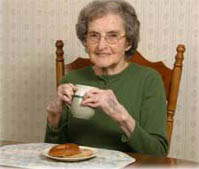Nutrition and Oral Health of the Older Adult
To help maintain proper nutrition and keep teeth and gums healthy, the older adult should continue to eat enough foods each day that contain calcium, protein and other essential nutrients. A healthy diet can help keep the mouth healthy.
The U.S. Department of Agriculture updated its nutritional guidelines in June 2005. USDA recommends selecting from the following food groups to help ensure a healthy diet every day:
Meat & Bean Group
- Go lean with protein.
-
Eat low-fat or lean meats & fish: broil or grill.
Grain Group
- Make half your grains whole.
-
Eat at least 3 ounces daily: breads, cereal, rice.
Milk Group
- Get your calcium-rich foods.
-
Choose low-fat or fat-free, or lactose-free.
Fruit Group
- Focus on fruits.
-
Eat a variety: fresh, canned, frozen, or dried.
Vegetable Group
- Vary your veggies.
-
Eat more dark green, leafy and orange-colored veggies
- Eat more dry beans, peas, and lentils.
(Source – http://www.choosemyplate.gov/)
Your family physician may also recommend a daily multi-vitamin or mineral supplement.
Avoid or limit foods and beverages high in sugar and starch, and low in nutritional value. Diet soft drinks should be limited – the acid in these drinks can contribute to tooth decay and gum disease. Alcoholic drinks should also be in moderation.
Is the older adult eating regularly?
At every age, good nutrition is an important part of good oral health. Older adults, however, may not get a balanced diet for many reasons. In fact, they may not eat regular meals, and that too, can hurt their oral – and overall – health.
Some of the reasons an older adult may not eat much or regularly could be:
- Ill-fitting dentures, or no dentures
- Tooth and mouth pain
- Depression and loneliness
- Alcoholism
- Very limited income
- Illness (Cancer treatment, for example, often changes eating habits and what can be eaten. It can also decrease desire for food.)
- Stomach pain can lessen the appetite.
- Alzheimer’s or other forms of dementia – This type of patient may forget to eat.
- Sense of taste is gone or weakened.
- Unable to shop or cook on their own
What can be done?
For oral disease or other illness, the appropriate health professional, e.g., dentist or physician, should be consulted. The family or caregiver should be advised of any suspicion that the older adult is not eating regularly or is not eating enough to maintain his or her nutritional health. Every effort should be made to provide regular, nutritional meals to the individual.
Your city or county may have a home-delivery meals program that serves home-bound adults or those on limited incomes. (The Ohio Association of Area Agencies on Aging or the Ohio Department of Aging can provide information and eligibility criteria for other elder assistance programs.
If finances are not a problem, professional caregiving services are available. These offer in-home assistance in areas such as grocery shopping, meal preparation, assisting with the daily hygiene routine, and other services.
Published with permission from Smiles For Seniors… an oral health initiative of the Ohio Dental Association
For more information:
Go to the Dental and Oral Health (Seniors) health topic.





